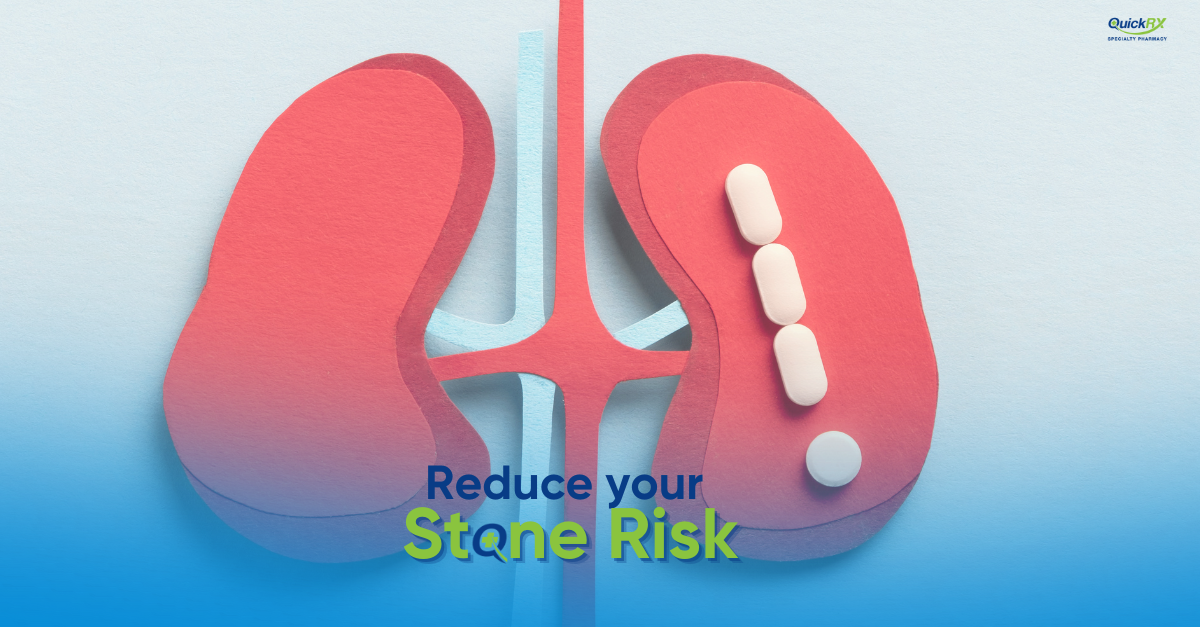Apply for Thiola (tiopronin) Copay Assistance, Patient Savings Card & Financial Help

How Thiola Copay Assistance & Patient Savings Cards Work

QuickRx Thiola (tiopronin) Copay Assistance & Patient Support
QuickRx Specialty Pharmacy helps cystinuria patients access Thiola copay cards and patient assistance programs to reduce out-of-pocket costs for tiopronin treatment.
Our Thiola copay help includes:
- Manufacturer copay card applications
- Patient assistance program enrollment
- Foundation grant coordination
- Insurance navigation support
Whether you have commercial insurance, Medicare, or are uninsured, we’ll find the right Thiola financial assistance program for your situation.
Many patients worry about the high cost of cystinuria medications. With QuickRx Specialty Pharmacy, you can access personalized support and resources designed to lower your expenses for Thiola (tiopronin). Our goal is to make treatment more affordable, so you can focus on managing your condition and preventing kidney stones.
Thiola Copay Card & Savings Programs
Get FREE help with Thiola (tiopronin) copay assistance programs.
QuickRx Specialty Pharmacy connects cystinuria patients to copay cards, manufacturer savings programs, and patient assistance to lower out-of-pocket costs for kidney stone prevention treatment.
✓ Thiola Copay Card Enrollment
✓ Patient Assistance Programs
✓ Foundation Grant Support
✓ Free Application Help
Eligible patients with commercial insurance may qualify for the Thiola (tiopronin) copay card.
Eligible patients with Medicare/Government insurance may qualify for patient assistance programs.
Fast approval for most commercial insurance plans. QuickRx handles all paperwork and applies discounts directly at the pharmacy. Most patients receive approval within 24-48 hours.
QuickRx Specialty Pharmacy provides completely free support to help patients enroll in Thiola copay assistance programs. We never charge service fees for copay card enrollment, patient assistance applications, or insurance verification.
Thiola (tiopronin) Start Form Below
Please fill out the form below to get started on your Thiola (tiopronin) copay assistance and we’ll be in touch within 1 business day with next steps.
Call Us for Immediate Assistance: (917) 830-2525

FAQs
Yes. QuickRx Specialty Pharmacy provides completely free support to help patients enroll in Thiola copay assistance programs. We never charge service fees, and the assistance programs themselves are designed to reduce or eliminate your out-of-pocket medication costs.
What’s included at no cost:
- Application assistance for copay cards and patient programs
- Insurance verification and benefit checks
- Prior authorization support when needed
- Ongoing monitoring to ensure continuous savings
- Prescription coordination and delivery arrangements
Thiola savings programs available:
For patients with commercial insurance, the manufacturer’s copay card can lower your prescription costs substantially, sometimes reducing copays significantly.
For Medicare and Medicaid patients, foundation-based assistance programs provide grants that help cover medication expenses. These programs are also free to apply for with QuickRx’s help.
For uninsured patients, manufacturer patient assistance programs may provide Thiola at no cost or significantly reduced prices based on financial need.
Our team’s only goal is to make Thiola more affordable so you can focus on managing your cystinuria without financial stress.
Eligibility for Thiola copay assistance depends on your insurance coverage and financial situation. Here’s how to get started:
Step 1: Contact QuickRx
Call us at (917) 830-2525, or fill out our secure online form. A QuickRx specialist will reach out to you within one to two business days.
Step 2: Complete enrollment forms
We’ll help you fill out short forms with your insurance details and prescription information.
Step 3: Provide basic documentation
Submit simple paperwork so our team can verify your eligibility for available programs.
That’s it! From there, QuickRx handles everything—from confirming your eligibility to applying discounts directly at the pharmacy. We’ll also coordinate medication pickup or home delivery and continue monitoring your benefits so you never experience a lapse in copay assistance.
General eligibility guidelines:
Commercial insurance patients typically qualify for manufacturer copay cards if they have private insurance and a valid Thiola or tiopronin prescription for an approved medical condition.
Medicare patients cannot use manufacturer copay cards due to federal regulations.
Uninsured patients may qualify for patient assistance programs that provide free or low-cost medication based on income and financial hardship.
Getting a Thiola copay card is straightforward when you work with QuickRx. Here’s the simple process:
Step 1: Initial Contact
Call QuickRx at (917) 830-2525, or fill out our secure online application form.
Step 2: Provide Information
Share your insurance details and prescription information with our team. We’ll need:
- Your insurance card information
- Your Thiola or tiopronin prescription from your doctor
- Basic personal information for the application
Step 3: Application Submission
QuickRx completes and submits your copay card application to the manufacturer on your behalf. We handle all the paperwork so you don’t have to worry about it.
Step 4: Approval
Most patients receive approval within 24 to 48 hours. We’ll notify you as soon as your copay card is active.
Step 5: Start Saving
Once approved, your copay savings apply automatically at the pharmacy. You’ll see the reduced price when you pick up your next Thiola or tiopronin prescription.
What happens next:
QuickRx continues monitoring your copay card status and handles any renewals needed. We’ll also coordinate your prescription refills and can arrange home delivery if you prefer.
If you’re initially denied for any reason, our team will help with the appeals process or connect you to alternative assistance programs.
Ready to apply? Contact us today for free help getting your Thiola copay card.
Medicare patients cannot use manufacturer copay cards due to federal regulations, but you still have options for financial assistance.
Why Medicare patients can’t use copay cards:
Federal law prohibits pharmaceutical manufacturers from offering copay cards or direct financial assistance to Medicare beneficiaries. This includes Medicare Part D prescription coverage.
Ready to explore your options? Call QuickRx at (917) 830-2525 to speak with a specialist about financial assistance options for Thiola. We’ll identify which programs you qualify for and handle all the paperwork on your behalf.
The cost of Thiola (tiopronin) varies depending on your insurance coverage and whether you use copay assistance programs.
Without insurance or assistance:
Thiola and generic tiopronin can be expensive when paying out-of-pocket. Costs vary by pharmacy and dosage prescribed.
With insurance but no copay assistance:
Your out-of-pocket costs depend on your specific insurance plan, including your deductible, formulary tier, and plan design. Some plans may require prior authorization before covering Thiola or tiopronin.
With copay assistance programs:
Commercial insurance + copay card:
Eligible patients with commercial insurance may significantly reduce their copay with the manufacturer’s copay card program.
Medicare patients:
Cannot use manufacturer copay cards, but may qualify for other assistance programs based on income and medical need.
Uninsured patients:
May qualify for patient assistance programs that provide medication at no cost or reduced prices based on financial need.
How QuickRx helps maximize your savings:
We identify ALL available assistance programs you qualify for, complete applications on your behalf, and ensure you’re getting the maximum savings possible. Our service is completely free—we never charge for copay assistance enrollment.
Want to know exactly what you’ll pay? Contact QuickRx at (917) 830-2525 for a personalized cost analysis based on your specific insurance and situation.
Thiola (tiopronin) is a prescription medication used to prevent the formation of cystine kidney stones in patients with severe homozygous cystinuria.
What is cystinuria?
Cystinuria is a rare inherited disorder that causes an amino acid called cystine to build up in the urine. When cystine levels become too high, crystals form and create kidney stones.
How Thiola works:
- Reduces cystine levels: Tiopronin binds with cystine in the urine to form a more soluble compound that can be easily eliminated from the body
- Prevents stone formation: By lowering urinary cystine concentration, Thiola reduces the risk of painful kidney stones
- Long-term management: Most patients require lifelong treatment to control cystine levels and prevent recurrent stones
Available formulations:
Thiola (immediate-release tablets): The original formulation of tiopronin
Thiola EC (delayed-release tablets): A newer formulation designed to reduce gastrointestinal side effects
Generic tiopronin: Available as immediate-release tablets
Treatment goals:
The goal of Thiola treatment is to reduce urinary cystine levels below the threshold at which cystine stones typically form. Your doctor will monitor your cystine levels through regular urine collections to ensure the medication is working effectively.
Thiola (tiopronin) is specifically FDA-approved for the treatment of severe homozygous cystinuria to prevent cystine kidney stone formation.
Cystinuria explained:
Cystinuria is a rare genetic disorder that affects how the kidneys handle certain amino acids. People with cystinuria have a defect in kidney tubules that prevents proper reabsorption of cystine, causing it to accumulate in the urine.
Why cystinuria causes kidney stones:
- Cystine has poor solubility in urine
- When cystine concentrations exceed solubility limits, crystals form
- These crystals aggregate into stones
- Stones can cause pain, infection, and kidney damage
Who needs Thiola treatment:
Thiola is indicated for patients with severe homozygous cystinuria who:
- Have recurrent cystine kidney stones
- Have not adequately responded to conservative measures alone (high fluid intake, diet modification, urine alkalinization)
- Require pharmacologic intervention to reduce urinary cystine levels
Combination therapy approach:
Thiola works best when combined with:
- High fluid intake (typically 3-4 liters daily)
- Dietary modifications (low sodium, moderate protein)
- Urine alkalinization (using medications like potassium citrate)
Your nephrologist or urologist will determine if Thiola is appropriate for your specific situation and monitor your response to treatment.
Proper administration of Thiola (tiopronin) is important for effectiveness and tolerability. Always follow your doctor’s specific instructions.
Dosing guidelines:
Thiola dosing is individualized based on your urinary cystine levels. Your doctor will adjust your dose to reduce cystine to target levels.
How to take Thiola tablets:
Immediate-release tablets (regular Thiola):
- Take on an empty stomach – at least 1 hour before or 2 hours after meals
- Swallow tablets whole with a full glass of water
- Do not crush, chew, or break tablets
Delayed-release tablets (Thiola EC):
- May be taken with or without food (check your specific brand instructions)
- Swallow tablets whole – do NOT crush, chew, or break
- The delayed-release coating is designed to release medication in the intestines
Important administration tips:
High fluid intake is essential:
- Drink 3-4 liters (about 1 gallon) of water daily
- Distribute fluid intake throughout the day AND night
- You may need to wake during the night to drink water
Maintain consistent schedule:
- Take Thiola at the same times each day
- Set phone reminders to avoid missing doses
- Use a pill organizer to track daily doses
If you miss a dose:
- Take the missed dose as soon as you remember
- If it’s close to your next scheduled dose, skip the missed dose
- NEVER double up doses or take extra medication
Storage instructions:
- Store at room temperature in a dry place
- Keep away from moisture, heat, and light
- Do not store in bathroom
- Keep out of reach of children and pets
Never adjust your dose without consulting your doctor. Thiola dosing must be individualized based on your urine cystine levels and response to treatment.
Thiola (tiopronin) can interact with certain medications and supplements. It’s critical to inform your doctor and pharmacist about everything you’re taking.
Known drug interactions:
Iron supplements:
- Tiopronin can significantly reduce iron absorption from the GI tract
- Separate tiopronin and iron supplements by at least 2 hours
- Your doctor should check iron levels periodically
Penicillamine:
- Both are chelating agents with similar mechanisms
- Generally not used together
- Sometimes used as an alternative if one is not tolerated
Vitamin B6 (pyridoxine):
- Long-term tiopronin use can cause vitamin B6 deficiency
- Your doctor may recommend B6 supplementation
What you should do:
Always inform your healthcare team about everything you’re taking before starting tiopronin, including:
- Prescription medications
- Over-the-counter medicines
- Vitamins and supplements
- Herbal products
Your doctor or pharmacist can review your complete medication list and advise you on any necessary precautions or monitoring.
Important: Never start or stop any medication without consulting your healthcare provider while taking Thiola.
Like all medications, Thiola (tiopronin) can cause side effects. It’s important to know what to expect and when to contact your healthcare provider.
Common side effects:
- Diarrhea, stomach pain, upset stomach, nausea, vomiting
- Decreased appetite
- Change in taste
- Mouth sores
- Cough
- Feeling tired or weak
Call your doctor if any of these side effects bother you or do not go away.
Serious side effects – contact your doctor immediately:
Signs of an allergic reaction:
- Rash, hives, or itching
- Red, swollen, blistered, or peeling skin
- Wheezing or difficulty breathing
- Tightness in chest or throat
- Swelling of mouth, face, lips, tongue, or throat
Signs of kidney problems:
- Unable to pass urine or change in amount of urine
- Blood in the urine
- Significant weight gain
Other serious symptoms:
- Fever
- Joint pain
- Swollen glands
- Any skin changes
- Swelling in arms or legs
- Chest pain
Important monitoring:
Your doctor will require regular blood tests to monitor for potential side effects. Attend all scheduled monitoring appointments.
To report side effects to the FDA, call 1-800-FDA-1088.
Certain people should not take Thiola (tiopronin) due to safety concerns. Always discuss your complete medical history with your doctor before starting this medication.
Do not take Thiola if you:
Have an allergy to tiopronin:
If you’re allergic to tiopronin, any ingredient in Thiola tablets, or any other drugs, foods, or substances, tell your doctor about the allergy and what signs you had.
Are breastfeeding:
Do not breast-feed while you take tiopronin.
Before starting Thiola, tell your doctor if you:
- Have any drug allergies
- Are pregnant or plan on getting pregnant
- Have kidney problems
- Have liver problems
- Have any blood disorders
- Take any other medications or supplements
Pregnancy considerations:
Tell your doctor if you are pregnant or plan on getting pregnant. Your doctor will weigh the risks and benefits of taking tiopronin during pregnancy.
Always provide complete medical information to your healthcare provider before starting Thiola.
The timeline for Thiola (tiopronin) to effectively reduce urinary cystine levels varies by individual, but most patients see changes within the first few weeks of treatment.
What to expect:
Initial response:
Tiopronin begins binding with cystine soon after you start taking it, but it takes time to see meaningful reductions in urinary cystine levels.
Monitoring timeline:
- Your doctor will typically check a 24-hour urine collection after 1 month of treatment
- This test measures whether Thiola is reducing your cystine to target levels
- Dose adjustments may be needed based on results
Stone prevention:
The goal is to prevent new kidney stone formation. You may not “feel” anything different when Thiola is working—the benefit is preventing stones that would otherwise form.
Signs treatment is working:
- Urinary cystine levels decrease on 24-hour urine collections
- Fewer kidney stones form over time
- Reduced frequency of stone-related symptoms
Long-term treatment:
Thiola is a maintenance medication that requires lifelong use to prevent cystine kidney stones. Stopping treatment typically results in cystine levels rising again and increased stone formation risk.
Be patient with treatment and attend all monitoring appointments so your doctor can assess effectiveness and adjust your dose if needed.
Thiola (tiopronin) use during pregnancy and breastfeeding requires careful consideration and discussion with your healthcare provider.
Pregnancy:
What you need to know:
Tell your doctor if you are pregnant or plan on getting pregnant. The risks and benefits of taking tiopronin during pregnancy must be carefully weighed.
Important considerations:
- Cystinuria itself can worsen during pregnancy, sometimes requiring treatment
- Your doctor will help determine if benefits outweigh potential risks
- Inform your healthcare provider immediately if you become pregnant while taking Thiola
- Do not stop Thiola without medical supervision
Breastfeeding:
Important warning:
Do not breastfeed while taking tiopronin.
It’s unknown if tiopronin passes into breast milk, but you should not breastfeed while on this medication. Discuss alternative feeding options with your healthcare provider.
Women of childbearing age:
- Discuss contraception with your doctor if you’re not planning pregnancy
- Notify your doctor immediately if you become pregnant
- Do not make changes to your medication without medical guidance
Your nephrologist or urologist can help weigh the risks and benefits specific to your situation. Never stop or start Thiola without medical supervision.
Thiola (tiopronin) is one of several treatment options for cystinuria, but it has specific characteristics that may make it appropriate for certain patients.
Available formulations:
Thiola (immediate-release):
- Original brand-name formulation
- Must be taken on empty stomach
- Proven effectiveness over many years of use
Thiola EC (delayed-release):
- Newer enteric-coated formulation
- Designed to reduce GI side effects
- May be taken with or without food depending on brand
- Better tolerated by some patients
Generic tiopronin:
- Bioequivalent to brand-name Thiola
- Same active ingredient and effectiveness
- May be more affordable option
Alternative treatments:
D-Penicillamine:
- Another chelating agent that reduces cystine
- Often reserved as second-line if tiopronin fails or isn’t tolerated
- Generally has more side effects than tiopronin
Conservative management:
- High fluid intake (3-4 liters daily)
- Urine alkalinization with potassium citrate
- Dietary modifications
- May be sufficient for mild cases
Treatment selection:
Your doctor will consider multiple factors when choosing treatment:
- Severity of your cystinuria
- Stone formation rate
- Tolerance of medications
- Response to conservative measures
- Your preferences and lifestyle
Most patients require lifelong medical management. Work closely with your nephrologist or urologist to find the best treatment approach for you.
Diet and fluid intake play crucial roles in managing cystinuria alongside Thiola (tiopronin) treatment.
Fluid intake – THE MOST IMPORTANT factor:
How much to drink:
- Drink 3-4 liters (approximately 1 gallon) of water daily
- Spread fluid intake throughout the day AND night
- You may need to wake during the night to drink water
- Adequate hydration dilutes cystine concentration in urine
Dietary recommendations:
Reduce sodium intake:
- High sodium increases cystine excretion in urine
- Limit sodium to less than 2,000 mg daily
- Avoid processed foods, canned soups, deli meats
- Read nutrition labels carefully
Moderate protein intake:
- Excessive protein (especially animal protein) increases cystine production
- Your doctor may recommend specific protein limits
- Don’t eliminate protein completely—just moderate intake
Medication timing with food:
Regular-release tablets:
Take on an empty stomach at least 1 hour before or 2 hours after meals unless your doctor has told you otherwise.
Delayed-release tablets:
Some brands must be taken without food. Some brands may be taken with or without food. Be sure you know how to take your specific brand.
Urine alkalinization:
Your doctor may prescribe medications (like potassium citrate) to alkalinize your urine. Follow these prescriptions carefully—they work synergistically with Thiola to prevent stone formation.
Never make changes to your diet, fluid intake, or medication schedule without consulting your doctor. Cystinuria management requires a coordinated approach for best results.
Proper storage:
Store Thiola or tiopronin at room temperature in a dry place. Do not store in a bathroom.
Keep all drugs in a safe place:
- Keep out of reach of children and pets
- Protect from moisture and heat
- Keep in original container
If you miss a dose:
Take your missed dose as soon as you think about it. If it is close to the time for your next dose, skip the missed dose and go back to your normal time.
Do not take 2 doses at the same time or extra doses.
Disposing of unused medication:
Throw away unused or expired drugs. Do not flush down a toilet or pour down a drain unless you are told to do so.
Check with your pharmacist if you have questions about the best way to throw out drugs. There may be drug take-back programs in your area.
If you have questions about storage, missed doses, or your Thiola prescription, contact QuickRx at (800) 496-6111.
QuickRx helps patients access financial assistance for generic dichlorphenamide through manufacturer programs and patient assistance options.
When brand Keveyis might be required:
In certain situations, your doctor might specify “brand necessary” or “DAW” (dispense as written) for Keveyis. If your prescription specifies brand Keveyis, QuickRx will dispense exactly what your doctor prescribed and help you access copay assistance for the brand version.
Questions about generic dichlorphenamide versus brand Keveyis?
Call QuickRx at (917) 839-2525 or toll-free at (800) 496-6111 to discuss whether your prescription allows generic substitution and to get a cost comparison for your specific insurance.
The medical information on this page is based on peer-reviewed clinical literature and authoritative drug references:
- Tiopronin prescribing information. Mission Pharmacal Company.
- Thiola EC prescribing information. Retrophin Inc.
- Servais A, Thomas K, Dello Strologo L, et al. Cystinuria: clinical practice recommendation. Kidney Int. 2021;99(1):48-58.
- Barbey F, Joly D, Rieu P, et al. Medical treatment of cystinuria: critical reappraisal of long-term results. J Urol. 2000;163(5):1419-1423.
Important: This page provides educational information about Thiola (tiopronin) and copay assistance programs and is not intended as medical advice. All medical decisions should be made in consultation with your healthcare provider.
Last reviewed: October 2025

Get Help with Thiola Copay Assistance Today
Don’t let medication costs prevent you from getting the cystinuria treatment you need. QuickRx Specialty Pharmacy offers free support to help you access Thiola copay cards, patient assistance programs, and foundation grants.
Call us today at (800) 496-6111 or complete the form above to get started.

